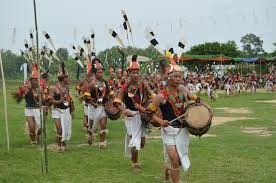Ollo Tribe:

In an effort to promote self-reliance and inclusive growth, the Khonsa Battalion of the Assam Rifles recently launched a skill-based initiative to empower women of the Ollo tribe under Operation Sadbhavana.
- It is an indigenous tribe inhabiting the Laju Circle of the Tirap district in Arunachal Pradesh, India, and parts of Myanmar.
- The Ollo people are also known as Oloh or Lazu Naga.
- Even though they live in two distinct countries, they maintain a close relationship.
- They speak the same dialect, practice the same religion, and follow the same traditions and customs.
- They are organised by clan-based systems with a hereditary chieftaincy system.
- The Ollo society is deeply patriarchal, with well-defined roles based on gender and lineage.
- Family, kinship, and leadership are governed by strict traditional norms that prioritise male succession and property rights.
- Historically known for their distinctive facial tattoos and once-practiced headhunting traditions, the tribe today continues to embrace development while preserving its cultural heritage.
- The Ollos construct houses made of stilts, although the chief’s houses of the villages are constructed with massive carved blocks and wooden pillars.
- According to the 2011 Census, the total population of the Ollo tribe in India is just over 1500.




